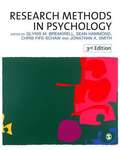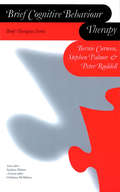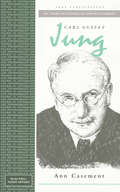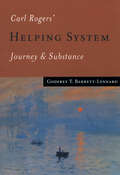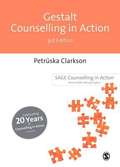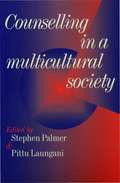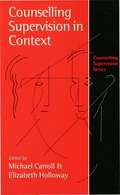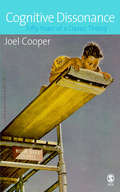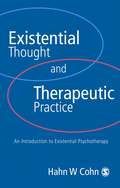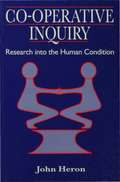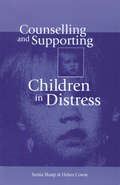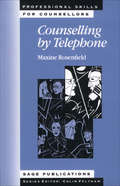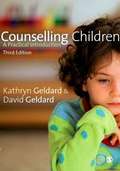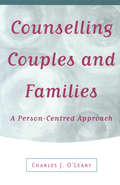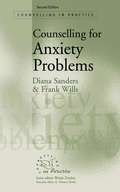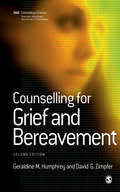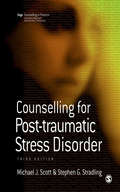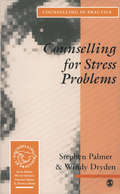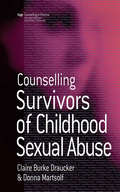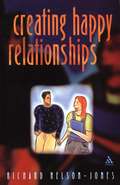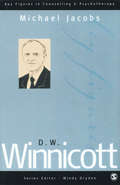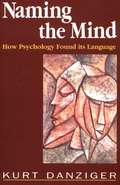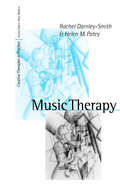- Table View
- List View
Research Methods in Psychology
by Glynis M. Breakwell Scan Hammond Chris Fife-Schaw Jonathan A. Smith`An excellent introduction to Research Methods. In fact it is more than an introduction - it is a sophisticated coverage for a book of this type. I would be more than happy to have my students use this book. and would recommend it to my colleagues. The authors take the topic seriously, and cover the broad range of research methods rather than focusing more narrowly on strict experimental designs. I consider that a real asset because there are many things worth investigating in this world that are not amenable to true experiments' - David C Howell, Professor Emeritus, University of Vermont Covering the key research methods - both qualitative and quantitative - this fully updated Third Edition of the best-selling textbook has been significantly revised and restructured in order to take into account developments in the techniques available to students and researchers in psychology and across the social sciences. A rich diversity of methods is encompassed, with each discussed fairly and robustly by an expert in the field. The book now has extended coverage of qualitative methods, and each of the primary qualitative methods used in psychology today. Since the second edition, some narrower chapters have been pulled together and more niche chapters have been removed - the result is a more teacher-friendly structure. Key features of the Third Edition include: - A new three-section structure, mirroring the three major processes in conducting research: the specification of the research question and design of the research activity; the choice of data gathering method; and the selection of data treatment regime. - Extended heuristic devices - more illustrative case study material, updated examples from current research to illustrate recent developments in methods and techniques, key words in bold at the end of chapters, end of chapter summaries and annotated further reading sections to assist in advanced research - A companion website is available offering a range of features for lecturers on a restricted access basis, and for students more publicly. These will help with exam assessment and written project work. Written in a lively and accessible style, Research Methods in Psychology ensures that progress towards a thorough understanding and skilled use of these various approaches can be achieved in easy stages, and the text is therefore essential reading for all methods courses that draw on the array of research techniques available in psychology.
Brief Cognitive Behaviour Therapy (Brief Therapies series)
by Stephen Palmer Berni Curwen Peter Ruddell`[This] will be a useful resource for anyone who is interested in learning more about Cognitive Behaviour Therapy' - Behavioural & Cognitive Psychotherapy This practical guide, based on the theory that emotional disorders are influenced by negatively biased thinking, describes how brief cognitive behaviour therapy can provide effective help to clients suffering from a wide range of disorders, including anxiety, depression, obsessive-compulsive disorder and post-traumatic stress, or those who are suicidal. Using illustrative case material throughout, the authors outline strategies for helping clients examine and overcome unhelpful beliefs and patterns of thought at the root of their distress. Following an explanation of brief therapy and the theory behind cognitive-behaviour therapy, they describe the process of working with clients through all stages of counselling.
Carl Gustav Jung (Key Figures in Counselling and Psychotherapy)
by Ms Ann Casement`This book offers a fresh and full introduction to Jung's psychology - it will be appreciated by many, from novice counsellors to the well-read analyst who will find... that there is much to learn about C G Jung' - Journal of Analytical Psychology `Ann Casement achieves an almost impossible task in her contribution to this useful series from SAGE, namely to create a lively overview of a complex man and his equally complex contributuions to analytic psychotherapy.... Casement achieves in this short book what Jung may have hoped to do when he reported a dream following a meeting with a publisher who was encouraging him to write a popular text of his ideas for the non-specialist. He had rejected the idea out of hand, but later he had a dream that changed his mind. "Jung found himself `standing in a public place addressing a great multitude of people who were listening to him with rapt attention and understanding what he said'" ' - Self & Society `Clearly written and well-informed, this impressive book is likely to become the single volume of choice for those psychotherapists and counsellors engaging with Jung and Jungian psychology as part of their training (whether wholly Jungian or more pluralistic). Ann Casement writes as an informed and enthusiastic insider who has also managed to retain her critical distance - hence what she has to say will also be relevant to more experienced readers' - Andrew Samuels, University of Essex Carl Gustav Jung is an enlightening and insightful guide to the life and work of one of the founding fathers of psychotherapy and most influential thinkers in modern times. Combining insights from his early life and his wide-ranging intellectual interests in philosophy, mysticism and parapsychology, Ann Casement traces the development of Jung's ideas on the functioning of the human mind, including the origins of core Jungian concepts such as archetypes, teleology, alchemy and the collective unconscious. Examining the relationship between Freud and Jung through their prolific correspondence, the author charts the growing divergence of opinion, which culminated in the birth of analytical psychology, the branch of psychotherapy established by Jung. Notwithstanding his unquestionable contribution to modern intellectual thought, Jung has been subject to severe criticism, including allegations of anti-Semitism and sympathy with the Nazi party. The book sets out clearly both the arguments levelled against Jung and responses to his critics. Particularly for the reader new to Jungian thinking, this book places the central concepts fully into context and provides the ideal starting point for further study of Jung and his work. Ann Casement is a Jungian Analyst in Private Practice, London and Chair of the United Kingdom Council for Psychotherapy. Her previous publications include Post-Jungians Today.
Carl Rogers' Helping System: Journey & Substance
by Godfrey T. Barrett-Lennard`This book is a monumental achievement, and person-centred practitioners will be indebted to Goff Barrett-Lennard for many years to come. He has written no only a definitive study of the history of person-centred approach - what he calls a report of the "evolutionary course of a human science" - but also an accompanying commentary which is unfailingly enlightening, sometimes provocative and occasional lyrical' - Brian Thorne, Emeritus Professor of Counselling, University of East Anglia and Co-Founder, Norwich Centre `I highly recommend this book as a reference source of major import, as bibliography, as history as art, and as a complex discussion of questions that plague the person-centred practitioner and the client-centred therapist' - The Person-Centered Journal `If you only ever buy one book about the Person-Centred Approach, other than those written by Rogers himself, this is the one. It is a staggering achievement by one of the most knowledgeable writers in the field' - PCP Reviews `This book is a gem, and should have wide appeal. It is an excellent introduction to person-centred psychology, written in accessible style, and it takes the reader beyond the simplicity often confused with naivety Goff Barrett-Lennard reveals a sophisticated complexity that challenges us to view the "person" with fresh eyes and an open mind' - Tony Merry, University of East London `I strongly recommend this book as a sophisticated treatment of the client-or person-centred approach to therapy and its applications to areas outside therapy. It is also a useful overview of research on all aspects of person-centred ideas' - Psychotherapy Research `This book. . . is not a single "meal" in itself but a positive "larder" containing every imaginable staple food and condiment all exquisitely and thoroughly researched. The book took Godfrey T Barrett-Lennard 20 years to write and it will stand as a reference text for person-centred specialists for longer than that. . . an essential reference text. . . and a pantry full of delicious surprises' - Counselling and Psychotherapy, The Journal of the British Association for Counselling and Psychotherapy `Probably the most important piece of work on the person-centred approach to have emerged in recent years. . . an essential source of reference for anyone with a serious interest in the person-centred approach' - Counselling News Written by an ex-student and long-time colleague of Carl Rogers, this in-depth and challenging book charts the development of person-centred therapy from its origins through to the present day. Godfrey T Barrett-Lennard traces the central concepts and key figures within the movement, set against the contemporary historical, social and political context. As an integrated overview of the person-centred approach, Carl Rogers' Helping System presents a wealth of fascinating ideas and information which is linked to a fresh, incisive account of the unfolding theory, process and research.
Circle Time for Emotional Literacy
by Sue RoffeyEmotional literacy has become an important issue in schools, and the ethos behind Circle Time is complementary to the thinking behind this. The Social, Emotional and Behavioural Skills curriculum (SEBS) is being established in schools, and it is recognised as contributing to a positive and successful school environment. Offering many new ideas and activities to try out in Circle Time, this book covers: - why your school needs Circle Time - how you go about starting Circle Time in your school - the underlying philosophy and basic rules - he role of the teacher as facilitator - how you make it work - what to do if language and attention issues are problematic - how to tackle common problems that can occur The activities look at promoting listening and attention skills, self-awareness and self-esteem, class cohesion and empathy, co-operation and friendship skills.
Gestalt Counselling in Action
by Petruska ClarksonSAGE celebrated the 20th Anniversary of the Counselling in Action in November 2008. To view the video - click here ------------------------------------------------------ `The reader looking for a clear and comprehensive introduction to Gestalt counselling need look no further. This work can be recommended wholeheartedly' - British Gestalt Journal `A handy update to Gestalt that shows it to be a mature and sophisticated approach to personality that has lost little of its inventiveness, iconoclasm and authenticity...a very useful source book' - Self and Society Gestalt Counselling in Action is a bestselling text , which has sold over 30,000 copies. Now in it's Third Edition, the book continues to be a popular text for training in counselling and psychotherapy and with practitioners who are new to the gestalt approach. Drawing on over 30 years experience as a gestalt practitioner, trainer and supervisor, Petruska Clarkson has written a lively and authoritative introduction to the approach, beginning with the theoretical and philosophical basis of gestalt. She clearly sets out the six main phases of the therapeutic process, introducing us to a client, 'Gary', whose case is used throughout the book to illustrate the process of therapy and the techniques used in each of the phases. Fully revised and updated, Gestalt Counselling in Action, Third Edition includes a new chapter which explores recent developments in the field and looks to the future for the gestalt approach.
Counselling in a Multicultural Society (Multicultural Counselling Ser.)
by Stephen Palmer Pittu Laungani`The book aptly describes, explores and hits the core of very complex issues around race, racism, culture, difference, dual identity, stereotypes, immigration and alienation. . . It is also very thought-provoking, raising questions about one's own ability to work more flexibly in the consulting room with clients of different backgrounds. . . It is excellent for a directory of resources, useful for training purposes and an enabling "role model" for good practice in counselling in a multicultural society. I enjoyed it. . . It should be a required handbook on the shelf of every caring professional working within a multicultural environment or setting' - Transformations, The PCSR Journal This book examines the many comp
Counselling Supervision in Context (Counselling Supervision series)
by Michael Carroll Elizabeth Holloway`The book is written in such a way as to challenge and educate through the use of exercises, scenarios and activities. Something it does rather well. . . . A well-written, practical and informative publication. . . of value to supervisees, supervisors and all those involved in counsellor and supervisor training' - Counselling Psychology Review `This book. . . argues that the social context is important for the individual client, supervisee and supervisor, as is the context in which the work and supervision are done. . . it is a clear, well-written and enjoyable book, containing helpful information for both supervisees and supervisors' - Transformations, The PCSR Journal There is an increasing awareness of the impact of individual factors on therapeutic work, both with clients and with their counsellors in supervision, but the influence of social contexts on this work has been less clearly articulated. This book provides counsellors with practical information about supervising specific types of clients and in specific organizational settings. Part One addresses four essential aspects of the individual - race, gender, disability and sexual orientation, exploring their influence on the therapeutic relationship and the supervision of trainee and experienced counsellors. Part Two assesses the impact of the organizations where counselling takes place - how different kinds of settings affect work with clients and thus the work of supervision. By highlighting context as a potential source of difficulty for the client, the book encourages trainees and supervisors to look beyond the individual and avoid placing the burden of responsibility for problems upon the client.
Cognitive Dissonance: 50 Years of a Classic Theory
by Mr Joel M. Cooper'Dr. Joel Cooper has been at the very forefront of research on dissonance theory for decades now. In this book, he provides a brilliant and engagingly-written review of the 50-year history of dissonance research and a masterful account of the ensuing developments in the theory. The book will be an outstanding resource for readers familiar with dissonance research and an enlightening introduction for those who are not' - Professor Russell H. Fazio, Ohio State University Why is it that people who smoke continue to do so knowing how bad it is for them? What drives people to committing adultery even though they inherently believe this is wrong? What's the outcome of this contradiction in the mind? Cognitive dissonance has been an important and influential theory since Leon Festinger published his classic work in 1957. It is known by every social psychologist, most psychologists of any stripe, and the lay public, making its way into such mainstream publications as The New York Times with increasing frequency and accuracy. Ultimately, dissonance has become one of the most popularly known expressions of social psychological insights, making its way into the literature in consumer, health and economic behavior, and has become a frequently used explanation of political behavior in the popular press and magazines. In marking the 50th anniversary of the theory's inception, Joel Cooper - arguably the scholar most associated with dissonance research in the past few decades - has presented a beautiful, modern and comprehensive analysis of the state of dissonance theory. This book charts the progress of dissonance theory, assessing its impact not only within our understanding of psychology but in everyday experiences as well. It should be important reading for students in social psychology, either undergraduate or graduate, but equally relevant to a host of other readers who need to understand or share the same passions for appreciating the significance of cognitive dissonance in the human psyche.
Existential Thought and Therapeutic Practice: An Introduction to Existential Psychotherapy (Clinical And Counseling Ser.)
by Hans W. Cohn`A lucid and much-needed account of existential psychotherapy. . . As well as locating existential psychotherapy within a historical and philosophical context, Hans W Cohn encompasses various therapeutic issues and provides some vivid and sensitive passages of case material. . . I found the book provided a concise and clarifying account of the underlying philosophy and of the psychotherapeutic practice. . . The existentialist challenge to Freud outlined in the book provides an alternative point of view to counter potentially engulfing aspects of a psychoanalytic vision. This is a stimulating book which is a valuable contribution towards dialogue between different approaches of psychotherapy' - International Journal of Psychotherapy `If you want at least one "existential psychotherapy" text in your library, buy this one. It's a winner' - The Psychotherapy Review The theoretical framework used by many counsellors and psychotherapists is predominantly `psychodynamic', rooted in psychoanalytic theory and frequently felt to be inadequate for an understanding of the many-shaded spectrum of disturbances experienced by clients. Although many practitioners have discovered existential-phenomenological thought, they may wonder what relevance these philosophical ideas have to their actual practice, to their day-to-day meetings with clients and to the relation between client and therapist. There is often a divide between thought and practice, and this book bridges that gap. The author introduces the history and ideas of existential phenomenology and existential psychotherapy, and shows how therapeutic phenomena familiar to all therapists and counsellors can be understood from an existential viewpoint. Hans W Cohn also demonstrates how the existential approach opens up access to issues that other therapeutic orientations have neglected, such as the difficulty of choice, the burden of responsibility and the inevitability of death. The existential approach is constantly compared to the relevant psychodynamic counterpart, so that readers can assess the unfamiliar against a background of the more familiar.
Existential Therapies
by Mick Cooper`This book achieves what it sets out to do: "to introduce readers to the rich tapestry of existential therapeutic approaches". I found it concise and easy to read, despite the fact that it deals with some fairly complex ideas'' - CounsellingResource. com `One can only applaud the bravery of an author who gently send up Kierkegaard''s wilful obscurantism and cleans out the acrid smoke of Gauloises from the room. With welcome clarity and sanity, Mick Cooper efficiently lays out the concepts, techniques and directions adopted by several key figures in the broad field of existentially informed psychotherapy. In an excellent first chapter, Mick Cooper pointed out my `ontic'' from my `ontological''; and I could see, behind the long-words-with-dashes, the true resonance of these ideas with real human and therapeutic issues, dilemmas and goals'' - Clinical Psychology `This book proves to be a real treasure chest: what you always wanted to know about existential psychotherapy but failed to find anywhere else in such a comprehensive, clear and concise manner. In that sense, this publication provides a missing link. One merit of the book is its systematic structure. As extensive, and in part as heterogeneous as existential philosophy and therapy also maybe, Mick Cooper had nevertheless been able to build convincing clusters with, on the one hand, an enormous understanding of details and, on the other, a far-sightedness that, like a map, provides orientation in the diversity of existential therapy. I really appreciate this publication and can recommend it very strongly'' - Person-Centred and Experiential Psychotherapies `Existential Therapies will I suspect, suddenly make "existentialism" come alive. The author, Mick Cooper loves his subject, it fascinates and enthrals him, and we get to experience some of that, even though the book is "academic". The connections and overlaps with person-centred psychology are there for us to be, but so are the differences'' - Person-Centred Practice `As an overview of a number of different existential therapies the book is extremely welcome and manages in a relatively short space to cover a wide arena. Overall I rate the book highly. To pull together a large and somewhat disparate literature, then make sense of it and finally retains the reader''s interest, is difficult'' - Existential Analysis `Mick Cooper has done an impressive job in writing a much needed, current and user friendly survey of the field of existential therapies. If I were to teach this course, I would use this book. I applaud Mick Cooper for having admirably achieved the aim he set out to achieve. All this makes Mick Cooper''s book a must-read for anyone wishing to explore the topic of existential therapy'' - Society for Laingian Studies Website `What makes this book unique is that all the different strands of Existential philosophy are always clearly linked to practice'' - Counselling and Psychotherapy Journal `This is a very fresh book, not treading well-worn paths and genuinely informing us about a small but important field. This is really an indispensable book for anyone who wants to understand existentialist approaches to therapy'' - Self and Society `This publication marks a milestone providing an excellent, clear and critical overview of the contrasting forms of the approach as it is currently practised'' - Emmy van Deurzen, New School of Psychotherapy and Counselling, Schiller University, London `This is a book of superb thoroughness and scholarship - an unprecedented guide to existential therapy''s chief positions and controversies'' - Kirk J Schneider, President of the Existential-Humanistic Institute, USA `Combines scholarship with a writing style that makes difficult concepts accessible. This book should be required reading on any course where the existential tradition plays a part, and that includes person-centred courses and all sympathetic to the idea that psychotherapy is, in essence, a human encounter where warmth, understanding and a deep respect for the individual are key values'' - Tony Merr...
Co-operative Inquiry: Research into the Human Condition
by John HeronThis is the first book to provide a comprehensive account of co-operative inquiry: a way of doing research "with" people where the roles of researcher and subject are integrated. Co-operative inquiry is a distinctive and wide-ranging form of participative research in which people use the full range of their sensibilities to inquire together into any aspect of the human condition. This book offers both an extensive exploration of its theoretical background and a detailed practical guide to the methods involved. Topics covered include: a critique of established research techniques; the underlying participative paradigm of co-operative inquiry; the epistemological and political aspects of participation; different types of co-operative inquiry and the range of inquiry topics; ways of setting up inquiry groups and enabling their development; four kinds of inquiry outcome and the primacy of the practical; the main stages of the inquiry cycle, highlighting key issues for practice at each stage; and special skills and procedures used for enhancing validity.
Counselling and Supporting Children in Distress (Children And Adolescents Ser.)
by Helen Cowie Sonia Sharp`A book which will be of great interest and use to teachers and school staff. . . case examples and details of interventions are very helpful. . . [a book for] teachers to dip into when faced with a pupil troubled by fears and phobias, or an issue such as bullying' - Young Minds Magazine `This book successfully integrates current theory, practice and research. It is concise and easy to read. . . . I broadened and deepened my understanding from reading it. I can imagine some EPs and others using individual chapters as informative, quick revisions of key subject areas. . . . Additionally, this book will be useful to the growing army of other adults now working with children and young people' - British Psychological Society Division of Educational and Child Psychology Newsletter Increasingly, the carers of children must call on basic counselling skills in their interactions with young people and their families. This book addresses the key issues and problems faced by adults involved in the care of children, and gives them the knowledge they need to provide effective support for the children and young people with whom they work. Integrating theory, practice and research, the authors give clear, accessible interventions designed to alleviate distress. They demonstrate how appropriate counselling approaches and support systems can be incorporated by practitioners into their existing repertoire of skills.
Counselling by Telephone: SAGE Publications (Professional Skills for Counsellors Series #3)
by Maxine Rosenfield`Well written, well researched. . . [the book] contributes to undermining ideas of professional hierarchy, in which long-term face-to-face is top of the pile, and short-term and the phone are the province of the amateur who knows not what they are up to. On the contrary, the counselling process as well as the use of counselling skills are resources that can be much more widely used than is possible if they are restricted to relatively long-term counselling. This is an excellent book covering a great deal of recent thinking about confidentiality, skills, training, quality and supervision in relation to the telephone [with] a useful chapter on its technology in relation to counselling' - Counselling and Psychotherapy, The Journal of the British Association for Counselling and Psychotherapy This book explores the essential skills needed to carry out effective telephone counselling - such as welcoming and establishing a relationship with clients; listening and responding; understanding silences; working with transference and fantasy; and recognizing and reacting to feelings - which are necessarily very often distinct from those involved in face-to-face counselling. Maxine Rosenfield challenges the view that telephone counselling is a poor relation to face-to-face counselling, arguing that for certain clients it may be the therapeutic medium of choice. She examines the benefits to both clients and counsellors of working by telephone, and highlights the technical and practical issues of which counsellors should be aware. She also covers the relatively new concepts of group counselling by telephone and counselling by other media, such as e-mail or letter.
Counselling Children
by Kathryn Geldard David Geldard`This is a book I would not be without and I suggest that all counsellors working with children should have it on their bookshelf - Emotional & Behavioural Difficulties `This book is clearly written and well organized text living up to its claims of being jargon-free. Good practice is stressed throughout, and I found it an easily read, interesting book which should appeal to interested practitioners from a variety of backgrounds. It could easily be described as a working handbook. Making it a useful addition to those considering counselling children'' - The Lecturer `If you only buy one book about counselling children - this is the one to buy. It is thorough, practical and easy to read. The main theoretical model used involves enabling the child to tell her/his story, and there are many practical suggestions about how to do this. The authors suggest ways to use different media and recommend which media are suitable for different ages of children. In addition to providing a framework for working with children, this is a useful handbook to refer to again and again. I highly recommend it'' `This book is straightforward and realistic in its suggested approach to working with children. The format and style make it easy to read and refer to. All sections are clear and enable the practitioner to incorporate the suggestions into a comprehensive approach to working with children and their families. A recommended read'' Amazon Reviews `[Counselling Children] goes on to cover just about all of the approaches the counsellor is going to need in dealing with families and individuals'' - Gerald Haigh, Times Educational Supplement `Counselling Childrenis a comprehensive guide for those interested in working therapeutically with children… the authors have combined clinical insight with a wealth of imaginative ideas, enabling counsellors to provide child-clients with tools to express themselves in their own terms. Its use of an interrogative writing style keeps the reader engaged, while its simplification of complex ideas and clarity of layout and language make it an indispensable reference book'' - Ashley Goff, Counselling Psychology Review Counselling Children, Second Edition is used on a wide range of training courses for those preparing to work with children. It is an excellent source of practical ideas and resources - including over 30 photocopiable worksheets. TO VIEW SAMPLE PHOTOCOPIABLE WORKSHEETS PLEASE CLICK HERE ---------------------------------------------------- Counselling Children is a highly acclaimed, introductory guide to counselling children and to the practical issues of communicating with children in a counselling context. In this, the Second Edition, Kathryn Geldard and David Geldard relate the theory and practice of counselling children in a highly accessible, practical and jargon-free style. Now including two new chapters, Counselling Children: - teaches specific counselling skills for use with children, illustrated with carefully chosen case examples - sets out a new model for counselling children which sequentially integrates ideas from a number of therapeutic approaches - provides advice on how to select and use a range of media, activities and play when counselling children - gives guidance on the benefits and practicalities of combining individual work with children and family therapy - includes worksheets to use when helping children in specific areas such as developing self-esteem and managing emotions. Counselling Children is an invaluable resource for students and professionals in many fields including counselling, social work, psychology, occupational therapy, mental health, nursing and education.
Counselling Couples and Families: A Person-Centred Approach
by Charles J O'LearyReader's comments: `Then along comes your book - lands on my desk like a gift, which I have barely put down since. It stopped me searching for external answers, helped me to dig into the knowledge, philosophy and way of working which already existed in me. I draw on it all the time for inspiration and a way of grounding me in the tentative moments of working towards a delicate connection with the families I encounter. I have a lot to be thankful to you for - I have now developed a way of working which seems helpful and which enables those around me to find a way forward, but perhaps most of all I finally feel comfortable and free to be the same counsellor I am with individuals - Hurrah!' - Kim Barber, Counsellor Lecturers' comments: 'A fascinating book which combines couple counselling with person-centred counselling. Will be recommended reading for social work students working with couple relationships' 'Very readible. Useful for students of counselling beyomd the 'title' focus of couples and families' `The only book on couple and family counselling from the person-centred approach' `This book is unique in its articulation of family therapy and the person-centred approach. It is also engaging in the way couples and the families come to life through Charlie O'Leary's acute and sensitive observation. It is an essential text in any person-centred therapy library'- Dave Mearns, University of Strathclyde `Compelling reading... I liked this book. It is intelligent, thought-provoking, occasionally funny and a delight to read. I warmed to the author's passion for the work of Carl Rogers.... All Relate counsellors will find something of value - even the strict psychodynamic practitioners' - Relate News `The author deserves congratulations on his easy, readable style. This will ensure that the book will be read, rather than simply browsed by many' - Sexual and Relationship Therapy `Provides a very good introduction for counsellors in working with families.' - British Journal of Guidance & Counselling `In this highly readable text, the theory and practice of counselling couples and families are successfully integrated with principles from the Rogerian/person-centred approach. In this sense the book is unique: although a lot of counsellors in fact practice relational therapy from a person-centred perspective, until now, no basic text was available in this field' - Alfons Vansteenwegen, INTAMS Review In this unique book, the theory and practice of counselling couples and families are integrated with principles from the person-centred approach. With numerous examples from actual sessions, the book clearly illustrates the key issues that couples and families face, and the ways in which the counsellor can help them to resolve these to their own satisfaction. Written primarily from the viewpoint of working with couples and families, issues specific to relational counselling are contrasted to those that arise when counselling individuals or non-related groups. The author then explores the process of relational counselling using the person-centred principles of empathy, congruence, unconditional positive regard and non-interference with the clients' actualizing tendency.
Counselling for Anxiety Problems (Therapy in Practice)
by Diana J Sanders Frank WillsAnxiety is one of the most common psychological problems for which people seek help. Through research, major advances have been made in understanding the causes of anxiety, the different forms it takes and how problems perpetuate. In turn this has led to the development of more targeted ways of helping sufferers. Based on these findings, Counselling for Anxiety Problems, Second Edition presents accessible and up-to-date guidelines on the most effective ways of helping clients with anxiety problems. <p><p> The authors outline general methods of working with anxiety sufferers and highlight the issues specific to this client group. Counsellors need to select appropriate interventions depending on the particular problems experienced by each client. The second part of the book therefore shows how to adapt counselling interventions to different forms of anxiety, such as: <p> - panic <p> - worry <p> - agoraphobia <p> - social and other phobias <p> - health anxiety, and <p> - obsessive-compulsive disorder (OCD). <p> Whilst being cognitive in focus, the book is accessible to counsellors from different orientations who wish to broaden their understanding and skills in relation to anxiety. Based on the authors' own clinical experience, the book makes extensive use of detailed case examples to illustrate different ways of formulating and working with anxiety. <p> Counselling for Anxiety Problems, Second Edition is suitable for practitioners of all levels, from those in training to those with more experience who wish to update and refresh their methods of working with anxious clients.
Counselling for Grief and Bereavement (Therapy in Practice)
by Geraldine M Humphrey David Zimpfer`The authors have done their homework in reading and consulting with the prominent literature, especially regarding children. All this effort gives the book a solid background foundation and makes it readable, and well-usable, for both lay counsellors and professional providers, and for all of us who are engaged in the delicate and rewarding endeavor of Grief Therapy' - Naji Abi-Hashem, Clinical & Cultural Psychologist, Berkeley, California Praise for the First Edition: `The book provides an absorbing and challenging journey through the possible process involved in bereavement work, and encourages one to think broadly about how one can approach a bereaved person... this was a book I enjoyed reading very much, and which I found both theoretically sound and practically helpful' - Bereavement Care (Cruse) Counselling for Grief and Bereavement, Second Edition is a bestselling, introductory guide for professionals who work with people experiencing bereavement through death and other forms of loss. Focusing on practical assessment and intervention strategies, Geraldine Humphrey and David Zimpfer guide readers through the essential theory and skills needed to work with clients in a way which sensitively facilitates the process of grief, initiates healing and promotes a sense of growth. Setting out the broad principles for practice, the authors go on to show how these can be applied in working with individuals, families and groups and in relation to specific issues including chronic and life-threatening illnesses, palliative care and complicated grief. Carefully chosen case examples illustrate the counselling process, while specific attention is paid throughout to ethical considerations and the possible need for referral. This fully revised and updated Second Edition features a new chapter on working with children and adolescents: both from the perspective of young people who are grieving losses and those who are receiving palliative care as patients. While focusing on the practical, the book provides a firm theoretical base by explaining key concepts such as attachment, grief and resilience. Geraldine M. Humphrey is Counsellor in the Department of Psychology at the North Canton Medical Foundation, specializing in death, illnesses, and non-death and grief. David G. Zimpfer is former Director of the Cancer Center of Ohio.
Counselling for Post-traumatic Stress Disorder (Therapy in Practice)
by Dr Stephen G Stradling Michael J ScottCounselling for Post-traumatic Stress Disorder, Third Edition addresses the specifics of counselling clients who have suffered major trauma, whether recently or in the past, and includes 18 detailed case examples together with transcripts of sessions. The authors' cognitive contextual approach translates the psychobiology of trauma responses into clinically useful analogies and simple drawings that guide the therapist and client. The book is unique in covering the diagnosis and treatment of the full spectrum of post-traumatic states. In this fully updated Third Edition the needs of special populations - children/adolescents, refugees and those in pain - are also addressed. Additional material includes a new PTSD screening inventory and a counselling competence scale. Counselling for Post-traumatic Stress Disorder, Third Edition is an invaluable, comprehensive aid for both the experienced and novice therapist working with trauma victims. Michael J. Scott is a Consultant Psychologist and External Examiner for the MSc Cognitive and Behavioural Psychotherapies Programme at the University of Chester. Stephen G. Stradling is Professor of Transport Psychology at Napier University.
Counselling for Stress Problems (Therapy in Practice #11)
by Windy Dryden Stephen PalmerSeminars by Professor Windy Dryden. See the man live and in action. To find out more and to book your place go to www. cityminds. com _______________________________________ `A welcome addition to the series. The co-authors. . . have endeavoured to give a thorough and practical guide to this vast subject and they have managed to do this within the confines of an easy-to-read, cheap and relatively short paperback. . . a very useful practical volume for the general counsellor to have on their book shelf' - Counselling, The Journal of the British Association for Counselling and Psychotherapy This comprehensive guide views stress counselling and management from a multimodal perspective. Clear guidelines show practitioners how they can give their clients the most effective help for their stress problems using a technically eclectic and systematic approach. The authors discuss the symptoms and causes of stress and outline a framework in which stress problems can be understood. They emphasize the importance of assessment as a guide to the selection of multimodal interventions and of tailoring the counselling approach for each client. Chapters discuss the range of interventions that can be used - cognitive, imagery, behavioural, sensory, interpersonal and health/lifestyle - and the most useful techniques that can be employed within these models, such as disputing irrational beliefs, coping imagery, psychodrama, relaxation training and assertion training. Case examples illustrate commonly used techniques.
Counselling Survivors of Childhood Sexual Abuse (Therapy in Practice)
by Donna Martsolf Dr Claire Burke DrauckerPraise for the Second Edition: `This is a user-friendly, readable, practical guide to assist survivors of childhood sexual abuse that will be particularly useful to students and practitioners who are new to this field' - Journal of Child and Adolescent Mental Health `This is a book that should give those who find themselves working with sexual abuse survivors some tools and skills for the job' - Young Minds Magazine `This book will be found valuable by all therapists and counsellors, not just those who have a special interest in childhood sexual abuse. Many will want to follow up the well-selected references the author gives. The detailed index will also help one to browse and read selectively' - Sexual and Relationship Therapy The experience of childhood sexual abuse is a trauma which continues to have an impact on survivors thoughout their lives. The pervasive and long-term effects that stem from sexual abuse make it vital that counsellors become adept at addressing the unique and complex needs of survivors. In this Third Edition of Counselling Survivors of Childhood Sexual Abuse, Claire Burke Draucker and Donna S Martsolf identify the significant healing processes which are essential to achieve recovery. These include: " disclosing the abuse " reinterpreting it from an adult perspective " addressing issues related to the context of the abuse; and " making desired life changes. Each of these processes is discussed in conjunction with the most effective counselling interventions to facilitate resolution. Carefully chosen case examples demonstrate the appropriate use of interventions in practice. The Third Edition includes a wealth of new material covering memory retrieval, outcome research, multicultural counselling, emerging therapeutic approaches, and neuroscience and counseling. Dynamics and difficulties in the therapeutic relationship are also discussed in great depth.
Creating Happy Relationships: SAGE Publications
by Richard Nelson-Jones'Relate counsellors interested in extending their learning about cognitive therapy will find this manual a comprehensive guide'- Jan Hobbs, Relate News 'An easy-to-read, comprehensive text which provides a practical guide to skills for starting, maintaining and cultivating successful relationships, whether of opposite sexes or the same sex' - The Australian Journal of Counselling Psychology Creating Happy Relationships is written in a comfortable non-academic style, using simple everyday English, and incorporates recent research and theory. In addition to many vignettes of partners creating and cultivating happiness there are plenty of practical activities for improving partner skills. This book is a major resource for prospective partners, couples, for marriage preparation and counselling courses, and human communication and relationship education courses in schools, colleges and universities.
D. W. Winnicott (Key Figures in Counselling and Psychotherapy #8)
by Michael Jacobs`The importance of Michael Jacobs' book lies in his attempt to convey. . . Winnicott's profound influence. . . . Jacobs rightly delights in the creativity and imagination of his subject and illustrates these with numerous quotations and descriptions from Winnicott's writings. . . . What is conveyed throughout the book is the essence of Winnicott. . . . [whose] gift was to make psychoanalytic language, methods and concepts more widely available, accepted and appreciated to a nonpsychoanalytic world' - British Psychological Society Counselling Psychology Review One of the best-known British psychoanalysts, D W Winnicott attracts the interest of counsellors and psychotherapists far beyond the strict psychoanalytic tradition in which he was trained. He coined many phrases that have entered the discourse of therapy, such as `good enough mother', `transitional object' and `facilitating environment'. Winnicott has had a profound impact on research into the mother-baby relationship, and his unorthodox manner and sparkling writing style have attracted enthusiastic acclaim. In this book, Michael Jacobs summarizes Winnicott's life and explains his major theoretical concepts. He also rigorously evaluates his practice as a clinician - for example, the holding and management of deeply regressed patients. While highlighting Winnicott's brilliance and creativity, Jacobs is not afraid to scrutinize his contributions more critically. He also discusses criticisms others have made of Winnicott, notably within the psychoanalytic movement. The final chapter assesses the influence of Winnicott's thinking in other countries as well as in Britain.
Naming the Mind: How Psychology Found Its Language
by Kurt DanzigerIntelligence, motivation, personality, learning, stimulation, behaviour and attitude are just some of the categories that map the terrain of `psychological reality'. These are the concepts which, among others, underpin theoretical and empirical work in modern psychology - and yet these concepts have only recently taken on their contemporary meanings. This fascinating work is a persuasive explanation of how modern psychology found its language. Kurt Danziger develops an account that goes beyond the taken-for-granted quality of psychological discourse to offer a profound and broad-ranging analysis of the recent evolution of the concepts and categories on which it depends. Danziger explores this process and shows how its consequences depend on cultural contexts and the history of an emergent discipline.
Music Therapy: Psychodynamic Music Therapy In Europe: Clinical, Theoretical And Research Approaches (Creative Therapies in Practice series)
by Helen M Patey Ms Rachel Darnley-Smith`This book is a detailed introduction to music therapy, and should be of particular interest to intending students of the subject and those wishing to pursue a career within the profession. It should be of considerable use to all with a general interest in the subject as well those making a career on music therapy' - The Organ `I found this a useful book in terms of its clarity and carefully thought out structure. It is a rich source of information and of ideas which are extremely important for the potential music therapy trainee to think about; it also makes valuable reading for more experienced therapists, bringing our minds back to some central questions about the nature of our work.... Whatever stage you may be at in your life as a music therapist, it will refresh your mind and your practice' - Eleanor Richards, Nordic Journal of Music Therapy From the Foreword: `Rachel Darnley-Smith and Helen M Patey have managed so well to tell their story of music therapy offering the framework of theory, training and professional practice, and the complimentary value of Analytical Music Therapy and Creative Music Therapy within improvization. The authors devote a whole chapter to promoting a wider understanding of improvisation, describing its value as a form of play, free association, with more or less structure depending on the form of intervention and the client's needs. There is really a valuable resource of meaningful and relevant examples from their own clinical work. These examples clearly validate and illustrate the seminal theoretical concept of the first great pioneer of music therapy in the United Kingdom, Juliette Alvin, who taught us that music is a creation of people, and therefore we can see people in their music' - Professor Tony Wigram Music Therapy is an introduction to contemporary training and practice. Written in a clear, jargon-free style, the book provides a lively source of information and ideas for all who are new to music therapy. Written by highly experienced practitioners, the book examines improvization, the principal method for music therapy, and points to the underlying assumptions about music, which shape this way of working. Two of the main music therapy approaches - Analytic Music Therapy and Nordoff- Robbins Music Therapy - are also outlined. Drawing on their own experience, the authors examine a range of clinical situations and give examples of working with children and adults with a range of needs, including autism, learning disabilities and mental health problems. They highlight the many issues which arise from day-to-day practice and explore other aspects of professional life, such as personal therapy and supervision. For anyone training or thinking of training to be a music therapist, this book provides an ideal place to start. As a guide to contemporary music therapy, it also has much to offer those already in practice.
